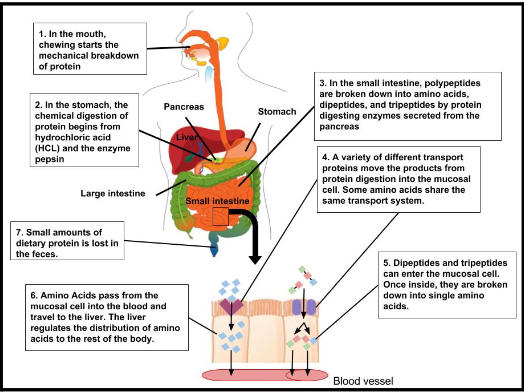
One macronutrient that we must consume every day is protein. It is essential for the synthesis of hormones and enzymes, as well as for the maintenance and repair of tissues. Furthermore, protein is necessary to support the growth and development of muscles and to keep the immune system functioning properly. However, a lack of protein makes the body rely on its skeletal muscles to maintain vital structures and activities, which eventually results in muscular atrophy (muscle wasting). In this blog, we will be understanding how to ensure proper protein absorption, but before that, let's examine how the human body breaks down protein.

Protein digestion is a complex process that involves several steps.
Digestion or breakdown of protein begins in the stomach, where the enzyme pepsin breaks it down into smaller fragments called peptides. The stomach's acidic environment helps activate pepsin and facilitate the breakdown process.
From the stomach, the partially digested protein moves into the small intestine, where pancreatic enzymes called trypsin and chymotrypsin further break it down into even smaller fragments called amino acids.
These amino acids are then absorbed by the small intestine and end up in the blood.
Once absorbed, the amino acids are transported through the bloodstream to different cells and tissues in the body. Here, they are utilised for protein synthesis, which is crucial for maintaining the structure and function of cells, as well as for the production of enzymes, hormones, and antibodies.
Additionally, any excess amino acids that are not immediately needed by the body can be stored or converted into energy.
For your body to absorb and use nutrients for energy, growth, and cell repair, they must be broken down into small enough pieces by your digestive system.
The digestion seems pretty easy, right? But when it comes to absorption, there are several factors that we need to consider, as they might hinder the rate of absorption. Following are the factors that affect protein absorption:
- Age: The most natural factor is age. As we age, our digestive system becomes less efficient, which can slow down the absorption of nutrients.
- Health of our gut: If we have any digestive disorders or imbalances in our gut bacteria, it can affect how well nutrients are absorbed.
- Protein Source: Different protein sources have varying digestibility and absorption rates. Animal-based proteins (meat, dairy, eggs) are often more easily absorbed than plant-based proteins, which may contain compounds that hinder absorption.
- Smoking and Alcohol Consumption: Smoking and excessive alcohol consumption can negatively impact gastrointestinal health, potentially affecting protein absorption. These lifestyle factors may contribute to conditions that hinder the efficient breakdown and absorption of proteins.
- Stress: Stress can potentially impact protein absorption through various physiological mechanisms. When the body is under stress, whether due to acute or chronic factors, it can lead to changes in the gastrointestinal system, affecting digestion and nutrient absorption.
The following tactics can be used to ensure that protein breakdown and absorption are operating at their best:
- Balanced Nutrition: A well-balanced meal contains a suitable number of carbohydrates, proteins, fats, fibres, and probiotics, as well as adequate hydration. Dehydration can impede digestion and food absorption, especially protein absorption. Including digestive enzyme sources, such as papaya or pineapple, can also aid in protein digestion and absorption.
- Incorporate a variety of protein sources: Incorporate a variety of protein sources into your diet, such as lean meats, poultry, fish, eggs, dairy products, legumes, and plant-based proteins like tofu or quinoa. This ensures that you are getting a wide range of essential amino acids necessary for optimal protein breakdown and absorption.
- Physical activity: It can be as simple as walking. The motto is to engage your body in regular physical activity to promote protein digestion and absorption. Exercise stimulates blood flow and increases the efficiency of nutrient absorption, including proteins. Additionally, staying active helps maintain a healthy weight, which can further support a proper protein metabolism.
- Protein timing: Protein timing is another important factor in supporting proper protein metabolism. Consuming protein-rich foods or supplements after exercise can help promote muscle recovery and growth. This is because the body is more receptive to protein absorption during this time, allowing for efficient muscle repair and synthesis. Additionally, spreading out your protein intake throughout the day rather than consuming large amounts in one sitting can also aid in maximizing protein metabolism and utilization by the body.
Are digestive enzymes necessary when taking protein supplements?
In the case of healthy adults, our digestive system can digest various amounts of dietary protein without any external help. If you are eating an omelette made with 3 large eggs, or 100 grams of paneer or 1 scoop of Gold Standard 100% Whey- your body can easily digest the protein and absorb the amino acids on its own. In case of any digestive issues, it is always advisable to consult with your doctor.
Take Home Message.
Simply put, distribute your protein consumption equally throughout the day. Take part in some physical activity, even if it's only walking. Staying well-hydrated is crucial. Recall that moderation is essential. See a dietician or your healthcare provider for expert guidance. They can offer tailored advice depending on your unique dietary requirements and objectives. It's also critical to pay attention to your body and modify as necessary to make sure you're getting the ideal quantity of protein for your overall wellness and health.



